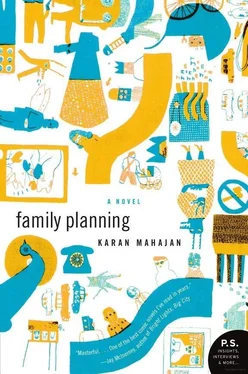“I have some work around here,” he said.
“I’ll get a taxi,” she said. “I’ll feel bad if you feel bad, so don’t worry about it, okay?”
“But why?” he asked. Then he had an idea. “My car can come any time. I have just one minute work in the plant shop, will you hold my bag?”
She did as she was told mostly because she was in shock, and before she could respond, he had dropped his backpack at her feet with a resounding thump and legged it through the green gates.
He entered the RC Kataria Plant Shop.
He returned minutes later with a potted tulsi plant and a still-full bladder.
This, however, had not been the plan.
The plan had been to skirt across the broken concrete floor crisscrossed by leafy shadows, observe the glorious mess of foliage, and find a bubble bath of rhododendrons to piss into. But the gardener, dressed in a spare dhoti and writing in a notebook, had viewed the schoolboy suspiciously and chased him all the way out of the plant shop with his eyes — preventing him from pissing and guilting Arjun into buying a plant that he now held out to Aarti by means of apology, the red pot feeling cold in his hands, the mud in the pot dark and gloomy like the inside of Aarti’s pupils.
“What’s this, Arjun?” she asked, standing on her toes. “Are you on your school’s green brigade?” She let on nothing about last night’s e-mail.
“Oh, that’s the work I had,” he said with great effort, as if the words were a dam across a lake of piss. “To buy a plant. For a science project. On photosynthesis. And fluorescence—”
“Arjun, actually I think I’ll take a cab,” she said. “I have FIITJEE soon, and I just called my parents on my mobile to tell them I’ll go straight there. Thanks so much for offering, though.”
“Can I offer you this plant?” he said with a goofy grin.
“Taxi!” she shouted.
Arjun couldn’t believe it: Was she really going to leave? If yes, why lead him on and touch him and hold him by the backpack straps for this? He was irritated and upset, particularly because he still needed to piss and because the entire problem of pissing could have been solved easily by…an erection. Courtesy of Aarti. An erection always stalled piss. He wished now that Aarti was more forthright and sexual, that her body offered up more of itself than it did — she was cute and affectionate and was sticking out her hip to hail a taxi, but that was all, the convent girls’ uniform made her seem formless, it wasn’t good enough to erase the memory of his parents making love two nights ago. Standing in the plant shop, he had felt the same way, imagining his parents in the bamboo grove, their bodies like two lush, large leaves, skin that shriveled to the touch, only tiny spots of perspiration reflecting off the foliage.
He wanted to see Aarti naked, was the thing. He wanted to grab hold of her hand, feel the veins piping the underside of her arm, fling the potted plant in the middle of the Nizamuddin roundabout so that the exploding shards forced the spirals of cars to widen and let them pass, both of them clambering into the blue tomb that sat at the base of the Golf Club Flyover, where he would finally kiss her, feel his way toward the dead bed of the gravestone, and say, “Do you want to start a riot?” referring of course to the fact that his penis was circumcised and outwardly Muslim and she was a Hindu, and if they had been having sex in a tense Hindu-Muslim area, their union might have triggered off communal riots, in fact the sex would be so amazing that there would certainly be riots, all sorts of people would die, new tombs would sprout up across the city, more places to dally in—
“You really should be careful about the taxis these days,” he whispered to her. “Most of the drivers are Ms.”
“Ms?” she asked.
“Muslims!” he said, and then looked around to see if the throng of passing Muslim boys — all dressed in tight white caps and gray kurtas — had heard. They had just crossed the road from the Nizamuddin Dargah, the Muslim shrine.
Aarti looked irritated. “Look, Arjun, that’s silly. This is the middle of Delhi. It’s the most boring place in the world. Nothing like that could happen. Nothing ever happens in Delhi. And if you ask me, our Hindu driver-types are the worst. These Muslims at least respect their women—”
“That’s true,” said Arjun. He felt chastised. “I’m only saying because — okay. I don’t want you to go.”
She thought for a moment. She bit her lower lip.
“Stay,” he said, “I like you.”
It appeared, for once, that he had said the right thing. She said quickly, “I like you too.” Then: “But have you seen this part of Delhi? It’s my favorite part of Delhi. Everything else is so boring. Here at least there is culture.”
He looked enviously at two men unzipping side-by-side under a giant keekar tree. He admired the gall of the peanut seller who was scratching his pelvis. The city at crotch level was where he belonged. He put the tulsi plant on the ground to commemorate the beginning of his relationship with Aarti.
“Let’s go for a walk,” she said.
Walking was good. Walking fast was better. It kept his bladder dancing. He used Aarti’s cell phone to call home and asked that Balwant Singh bring the car to Nizamuddin, and yes he was fine, he was just buying a plant, he’d be right back, okay bye.
Then he clicked the phone off and turned to Aarti and started talking about the band. He told her how they’d forged a signature rock style on the flyover. How they’d one-upped their competition by choosing as their summit a place still swirling with searchlights of dust and dampness; how the passing cars had all plunked gravel into the dicey-looking pits below. She was duly impressed, and said, “Where do you practice regularly?”
“On a flyover, yaar,” said Arjun.
Suddenly the band name was clear to him: The Flyover Yaars. The next day in school he presented it to his band-mates amid much fanfare; the four boys threw themselves into the project of mythmaking. They broadcast freely to their classmates about their bold shenanigans on the Godse Nagar Flyover. Drew diagrams of musical levitation on the blackboard that shimmered at noon, chalky pulsars radioactive with rumors. Preached the legend of the band to the white-uniformed masses. Were even felicitated with free offerings of slimy chow mein in the canteen, which they set on fire to see if they truly contained petrol, as the popular legend went. But there was no soy-blaze, no biohazard, only extra-charred noodles.
Aarti said, “Here we are.”
They entered the shanty through a narrow alley smeared with slush. On either side were tiny shacks serving tea and huge fluffy naans and rotis. Men glanced at them as they reached with giant spears into the glowing cylinders of their tandoors. Goats strained at their tethers; Aarti reached out to pet one. All around Arjun were alien-looking signs in Urdu: Muslim bookstores, Waqf boards, tube-light shops. The men and women in the area appeared to be staring at Aarti, her bare knees poking forward into the dusty afternoon light. Yet she was utterly un-self-conscious. Arjun walked a little behind her, both hands dug into his back pant-pockets.
He was squeezing his butt to hold in the piss. It appeared, strangely, to work.
“Don’t you love that this is the middle of Delhi?” she said. “All these women in burkhas and all these beautiful dilapidated buildings. But wait till you go into the dargah. Sometimes they have qawallis here. It’s really amazing. Do you know how old this is?”
To Arjun it all just seemed poor. They entered a quadrangular space between buildings and stood at the edge of a tank filled with water. Children were climbing up to the precarious ledges of the buildings, hanging their shirts on the spikes of TV antennae and then diving down into the tank as if this were the most natural thing in the world. They screamed and cursed. In the dappled light Arjun studied Aarti’s reflection in the water, only to have it shattered with a splash. They both stepped back.
Читать дальше












